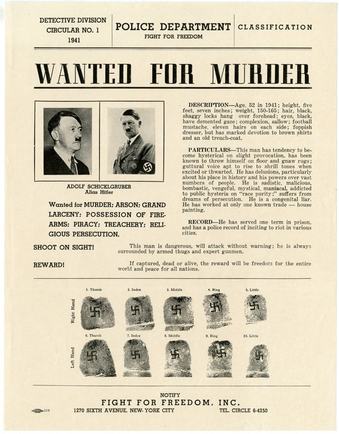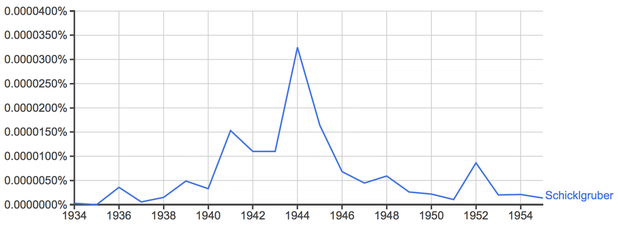Allow me to introduce you to Adolf Schicklgruber:
 Courtesy NY Historical Society's Pinterest.
Courtesy NY Historical Society's Pinterest. The origins of the popular practice went back to the interwar period in Europe, during Hitler's rise to prominence. Anti-Nazi Hungarian newspaperman Hans Habe first claimed that Hitler's real family name was Schicklgruber in 1935. Hitler was so concerned about this, as well as other myths stating that he might have Jewish ancestry, that he commissioned a formal investigation of his genealogy by Rudolf Koppensteiner, which became the 1937 book Die Ahnentafel des Fuehrers ("The Pedigree of the Leader").
In the U.S. in 1952, the less biased and less afraid-for-his-life scholar Alan Bullock laid out Hitler's family story, debunking the claims that Hitler had actually been born Schicklegruber. There was a significant grain of truth in the popular myth: Adolf Hitler's father was born out of wedlock to a Maria Schicklgruber; her son (and Adolf's father) Alois bore the Schicklgruber name until the death of his purported father, Johann Hiedler. Midway through life, Alois changed his name legally to Hitler, the name he then passed on to his son.
Google ngram is one tool available to give historical researchers one idea of the popularity of phrases, ideas, and terms; Google will search their entire archive of digitized historical materials, including books, newspapers, magazines, and other media, and track occurrences of any word, words, or phrases of your choice. As we can see below, the Schicklgruber story clearly starts around 1935; one early peak seems to be near the US entry into the war, with another in 1944. Interest in name-calling the German Furher then drops off until the myth is debunked in 1952, drawing it into the public eye briefly once more:
Donald Drumpf
But really, if you haven't watched the segment yet, you should. Here's the whole bit, but the Drumpf name comes up starting around 18:40. Alternatively, you can just read the excerpt below:
If you are thinking of voting for Donald Trump, the charismatic guy promising to ‘Make America Great Again,’ stop and take a moment to imagine how you would feel if you just met a guy named Donald Drumpf: a litigious, serial liar with a string of broken business ventures and the support of a former Klan leader who he can’t decide whether or not to condemn. Would you think he would make a good president, or is the spell now somewhat broken?
What's In a Name?
 courtesy www.donaldjdrumpf.com
courtesy www.donaldjdrumpf.com But it seems like there is something different about the use of family names, rather than descriptive labels and critiques, to smear political figures. On some level, we must not really believe that "a rose by any other name would smell as sweet," if we repeatedly hope that simply calling Hitler 'Schicklgruber' or Trump 'Drumpf' can break the spell. It seems like if only the enemy can be properly named, the truth can be revealed and their power can be dissolved.
The more apt literary reference would be the Brothers Grim fairytale, Rumplestiltskin. In the tale, the title character is a magical little man who helps a country girl achieve all her dreams, but at an increasingly high price. Finally, he takes away her child and refuses to return it unless the now-queen discovers his true name. With the help of a spy, she discovers his name and correctly pronounces it:
"The devil told you that! The devil told you that!" shouted the little man, and with anger he stomped his right foot so hard into the ground that he fell in up to his waist. Then with both hands he took hold of his left foot and ripped himself up the middle in two.

 RSS Feed
RSS Feed